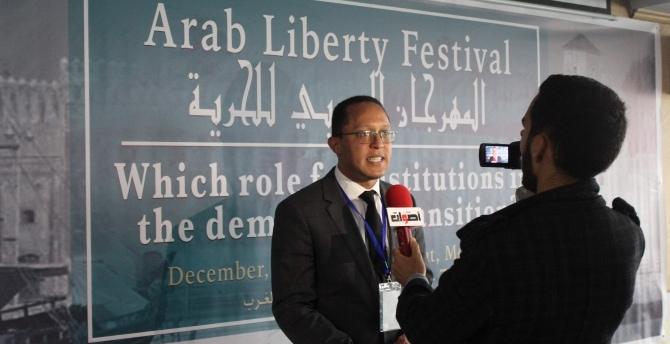Fourth annual Arab Liberty Festival discusses economic prosperity and democratic transitions in MENA
- Date:

The fourth annual Arab Liberty Festival, held from Dec. 7–8 in Rabat, Morocco, focused on the role of institutions in fostering and consolidating a democratic transition in the Arab world.
Hosted by the Arab Center for Scientific Research and Humane Studies and sponsored by Atlas Network, the Arab Liberty Festival brought together nearly 100 members of free-market think tanks and organizations from across the region.
“The conference was a platform where young civil society actors and young leaders from across the Arab World came to meet, exchange and also learn about the institutional framework underpinning the democratic experience of other countries from outside the Arab world,” said Kathya Berrada, research associate at the Arab Center. Organizing on the theme of democratic transitions and economic development in the Arab world, there were two major panels with the first discussing the role of institutions in advancing and consolidating democracy and the second discussing which kind of institutions are necessary to sustain democracy and economic development in the Arab region.
The conference featured two days of interactive sessions on how the think tanks, scholars, and activists gathered can get past the diagnosis stage and implement real strategies to strengthen institutions, create economic prosperity, and drive the Arab world through a democratic transition.
“A number of Arab countries are facing serious challenges,” continued Berrada. “Syria is in the midst of a war. Yemen, one of the Arab world's poorest countries, has been devastated by a civil war. Libya appears to be descending into anarchy. The latest development in Egypt questions any serious attempt toward democracy. Morocco and Jordan have engaged in reforms but are still facing major challenges in developing full-fledged constitutional monarchies. Although praised for its relatively peaceful transition to democracy, Tunisia is still struggling economically. As such, the international community needs to take a long-term view of the democratic transition.”
At the Arab Liberty Festival’s gala dinner, Atlas Network presented its 2018 Regional Liberty Award for the Middle East and North Africa (MENA) region to the Pal-Think for Strategic Studies for its work in advancing a culture of non-violence in Gaza. Pal-Think developed a 10-day course — in conjunction with its partner FXB — for university graduates that focused on nonviolent methods of accomplishing change, such as lobbying and advocacy. Program participants then went on to teach what they had learned to others. This included teaching children how to encourage their own self-confidence and peaceful conflict resolution with others. At an event for mothers, Pal-Think discussed the importance of encouraging tolerance and positive dialogue between family members — especially teenagers — in order to promote a culture of nonviolence in Palestinian society. Pal-Think also confronted problems like extremist ideology and violence against women.
“Winning the 2018 MENA Liberty Award means many things to me,” said Omar Shaban, director of Pal-Think for Strategic Studies. “It conveys a strong message of support and appreciation for our work in promoting the values of freedom, entrepreneurial spirit, democratic transformational and the culture of nonviolence.”
Atlas Network Executive Vice President for International Programs and George M. Yeager Chair for Advancing Liberty, Dr. Tom G. Palmer, delivered a speech on “Constitutions, Institutions, and Social Habits” to discuss the role of institutions in controlling power and why limited government is at the heart of constitutional liberal democracy.
The Arab Liberty Festival concluded with a pitch competition for projects developed through the Arab Center’s Averroes Academy. Now in its fifth year, the Averroes Academy is an advocacy training program created with the goal of building new capacity within civil society organizations, so that their members can more effectively advance and advocate for economic reforms in their countries. The program specifically focuses on advocating reforms and insightful ideas for change, with the aim of improving business climates, promoting entrepreneurship, and empowering a strong and competitive private sector throughout MENA and beyond.
Participants in the Averroes Academy receive a six-day training that includes lectures, workshops, and networking. Each of them identifies a key economic issue to focus on as part of a longer-term project and then spends six months working with a mentor to develop a policy paper on the issue. The program concludes with a three-day training and presentation of the completed papers at an international conference and trains 20 participants annually. The winners of this year’s pitch competition came from Tunisia: the winner was a team represented by a young civil society actor — Fares Ben Terzi. The pitch dealt with easing administrative procedures for starting up a business as a means to improve the business environment in the Arab world.